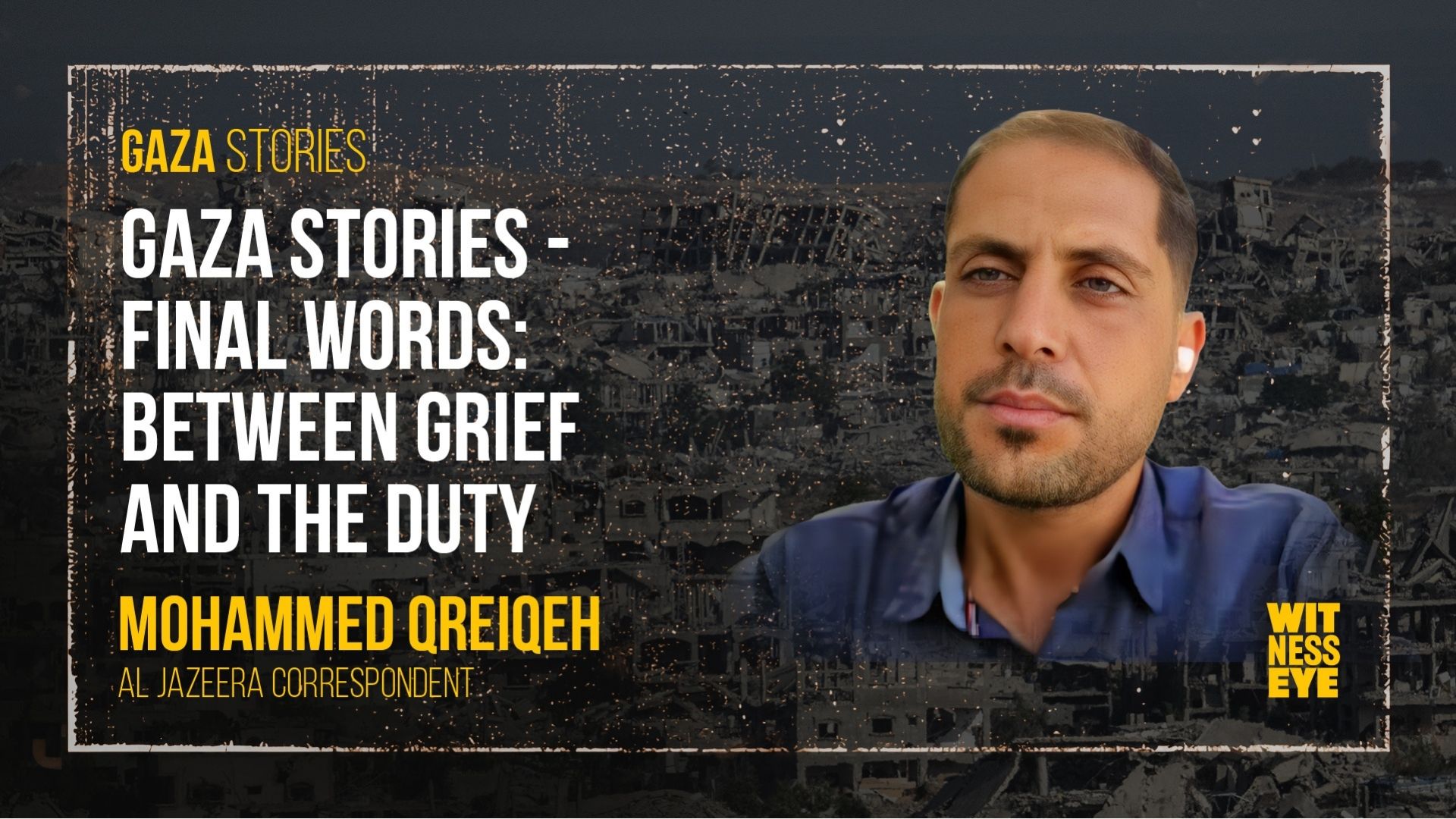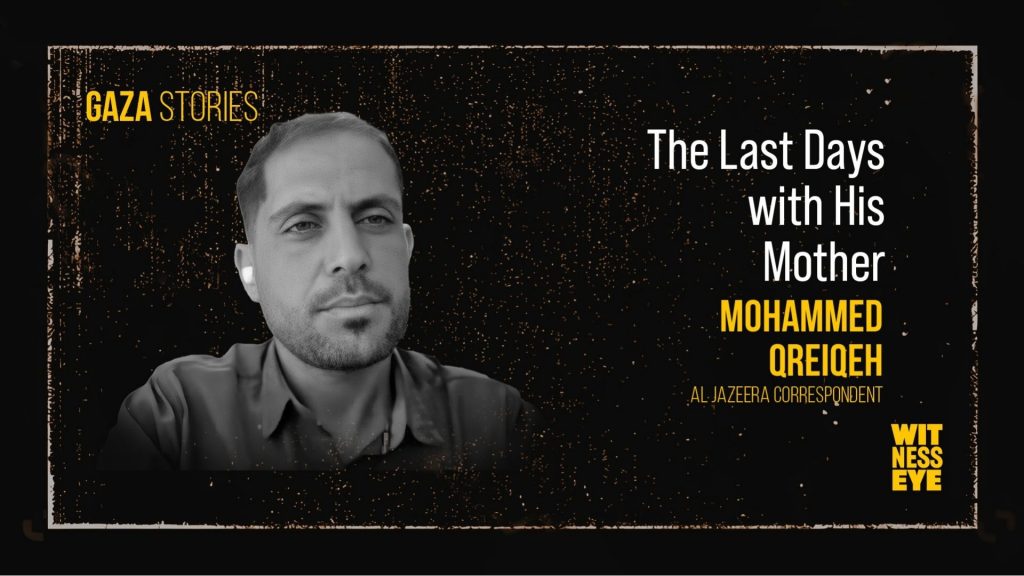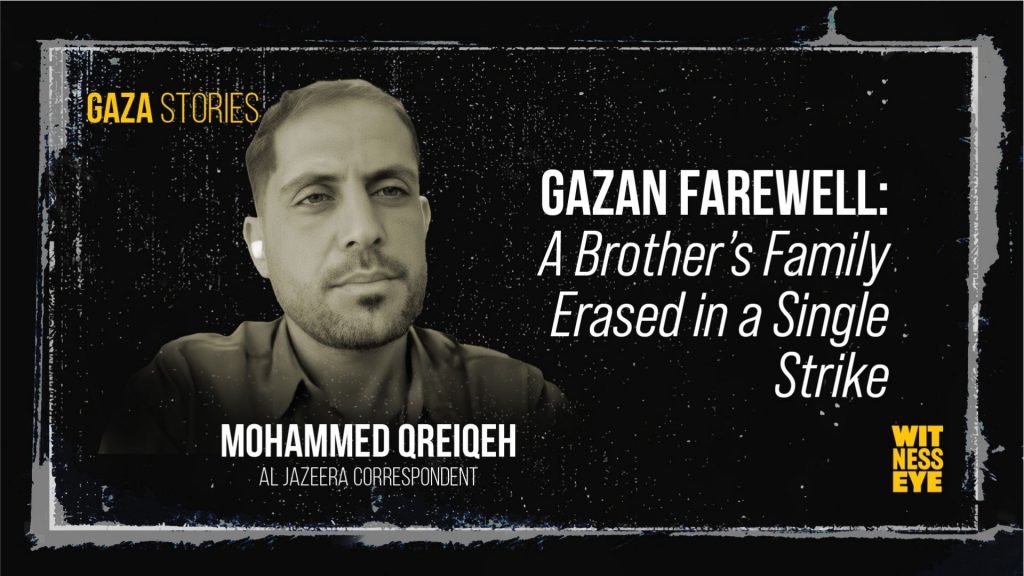
War has taken almost everything from Mohammed Qreiqeh—his mother, his brother, his home. Yet, even as he buries his family, he returns to the camera. For him, journalism is not just a profession. It is a duty born from loss, a way to keep memories alive when graves are destroyed and voices silenced. Each report he delivers is heavy with grief, yet anchored in truth. He knows that every testimony, every picture, and every word matters. In Gaza, where silence can mean erasure, Qreiqeh chooses to speak, carrying both his pain and his people’s story into the world.
A Journalist Shaped by War
Al Jazeera correspondent Mohammed Qreiqeh does not appear only as a journalist. As he explained in his interview, “before being a media professional, I am one of the direct victims of this war.” His life and his reporting cannot be separated. Qreiqeh has worked in media since 2012. “This war is completely different,” he said, his voice heavy with exhaustion. For him, Gaza is not just a subject to cover. It is his home, his family, and his graveyard.

The Last Days with His Mother
In the interview, Mohammed Qreiqeh spoke with raw pain about his mother, Naima. She had diabetes and heart disease, and had even undergone heart surgery before the war. Still, she fled with him from place to place, never finding rest. “We were displaced more than fifteen times,” he recalled, his voice heavy.
They moved between UNRWA shelters, schools, tents, and sometimes the bare sidewalks. Many nights, mother and son lay on the street, exposed to bombs above and stray dogs around them. “It was the last look,” he whispered. Later, survivors told him what he already feared—his mother was not lost to a stray bullet. She was executed deliberately, near the maternity ward. “My mother was killed on purpose,” he said, his words breaking under the weight of truth.
The Phone Calls That Became Farewells
Before her death, there were still small moments of connection. Mohammed managed to reach his mother by phone through another woman’s number. Her words still echo in his mind: “I have no food. I have no drink. I am on the ground.”
She spoke more like a friend than a mother, her tone weakened by hunger. “Come take me with you,” she begged. “Where did you go? Why did you leave me?” He noticed the unusual softness in her voice, a hint of resignation. “I was surprised by her voice,” he said. “It was not the voice of my mother I knew.”
The following day, he called again. She told him she had slept on the ground without food, then urged him to take care of himself. Soon after, contact ended. For two weeks, he searched frantically, asking survivors about her fate. Some said they saw her pleading with soldiers near tanks. Others said they saw her body left in the courtyard. Eventually, it was confirmed: she had been executed while lying on the ground.
“I regret I was not with her,” Mohammed said. “I should not have left her alone. But we were separated by force.”

Gazan Farewell: A Brother’s Family Erased in a Single Strike
The cruelty did not stop with his mother. Mohammed’s brother Karim was killed alongside his wife, children, and grandchildren. In a single night, twenty-eight relatives were wiped out when their home was struck without warning. They had only just come back from the south, hoping to mend what was left of their house. That night, bombs struck directly, collapsing six houses at once. Some bodies were never recovered. Civil defense told Mohammed that the force of the missile caused people to “evaporate.” The word still haunts him. “Why were children under three killed? Why were the elderly killed in their homes?” he asked, his voice trembling with anger.
Funerals were held for some relatives. For others, no bodies were ever found. He searched alleys, shelters, and rubble, but there was nothing. “They disappeared completely,” he said. “Internationally banned weapons were used. They caused people to vanish without a trace.”
Hunger, Displacement, and the Struggle to Survive
Beyond death, Mohammed described the daily reality of survival. He recalled nights of sleeping in the streets, using concrete blocks as pillows. Above them, planes fired randomly, and stray dogs prowled through the ruins.
One night, during cold rain, his mother begged for blankets. He risked his life, cycling back to their destroyed home in Shujaiya. He crossed abandoned streets, dodged artillery fire, and hid in ruined houses. “I thought I would die,” he admitted. “Martyrdom was near, but I had to bring her something.”, “It was famine,” he said. “There was nothing else to eat.” Now, he faces the same struggles with his own children. His daughter Zina asks for biscuits, but there are none in Gaza. His son Zain wants to see the sea, but even short trips risk death. “What is the fault of my children, and all the children of Gaza,” he asked, “that even the simplest needs cannot be met?”
Carrying the Weight of Journalism Under Threats
Despite his grief, Mohammed continues reporting. He buried his mother, then six hours later, stood before a camera. He explained that colleagues like Wael al-Dahdouh also returned to their work after losing entire families. For them, journalism is not just work. It is survival of memory.
“We must deliver the message,” Mohammed said. “Otherwise, their deaths are erased.” The threats are constant. Journalists receive phone calls warning them that their homes will be bombed. Many were arrested from hospitals. Some remain missing. More than 220 journalists have been killed since the war began, including photographers, editors, and sound engineers. Foreign correspondents are absent. Only local journalists, sons and daughters of Gaza, carry the burden.
When asked how he continues, Mohammed gave a simple answer: “It is our responsibility. These are our streets, our families, our massacres. If we do not tell it, who will?”
Witnessing the Storming of Al-Shifa in Gaza
Among the darkest moments was the storming of Al-Shifa Hospital. Mohammed described being trapped for sixteen hours in the kidney dialysis department. Around him, wounded patients cried for water, elderly people fainted, and soldiers forbade anyone from moving. “Imagine sitting for sixteen hours without standing, without water,” he said. Shells fell inside the building. Shrapnel tore through patients. Some died in front of him. Soldiers beat detainees with rifle butts, stripped them naked, and humiliated them publicly. “There was no reason,” Mohammed said. “The beating was just for beating.”
He still suffers from the blows to his lower back. His last look at his mother was through soldiers blocking their path. “She shouted, ‘My son, come back, they hit you.’” His voice faltered at the memory.
The Everyday Weight of Loss
Life after such losses is unbearable. Mohammed described how even walking the streets feels heavy. Hunger weakens people until they stumble and fall. Children collapse from exhaustion. Elderly die because medicine is unavailable. Even water is poisoned. “We drink polluted water because we have no choice,” he explained. “Hunger is deadly. It kills faster than bombs.” He admits feeling shame when his children ask for simple things. Zina wants biscuits. Zain wants a trip to the sea. He has no answer to give them. “I cannot provide the smallest thing,” he said. “This is what breaks me the most.”
Why Gaza’s Stories Must Be Told
For Mohammed, silence is impossible. He has seen neighbors buried under rubble, mothers begging soldiers for mercy, children starving in the streets. “This is not only about us,” he said firmly. “It is about justice.”
Every testimony, every image, and every report is a defense against forgetting. Journalists in Gaza are not only holding cameras. They are carrying the memory of the erased. They are standing as witnesses for those who cannot speak anymore.
Mohammed Qreiqeh lost his mother, his brother, and most of his family. He lost his home, his safety, and his peace. And after giving this interview to Witness Eye, days later, he was brutally killed by an airstrike. Throughout his life, the duty remained unchanged: to keep Gaza’s truth alive until the world finally chooses to see.
Mohammed’s words showed me more than the destruction of war. They revealed the weight of a man’s grief. He is more than a journalist. He is a son who lost his mother, a brother who buried his sibling, and a father who cannot bring bread to his children.
The image that stayed with me was when he searched through rubble to find a blanket and a few vegetables for his mother. In that moment, even in the heart of war, he showed what love means.
Listening to him, I realized these stories are not only about Gaza. They belong to humanity’s memory. They must not be erased. Because the moment we forget, we allow such suffering to return.
Stay Connected with Witness Eye
Follow us on our official channels:
